北师大版(2019)必修第二册Unit 5 Humans and Nature Lesson 2 Professional Rescue Team 课件(29张PPT)
文档属性
| 名称 | 北师大版(2019)必修第二册Unit 5 Humans and Nature Lesson 2 Professional Rescue Team 课件(29张PPT) |
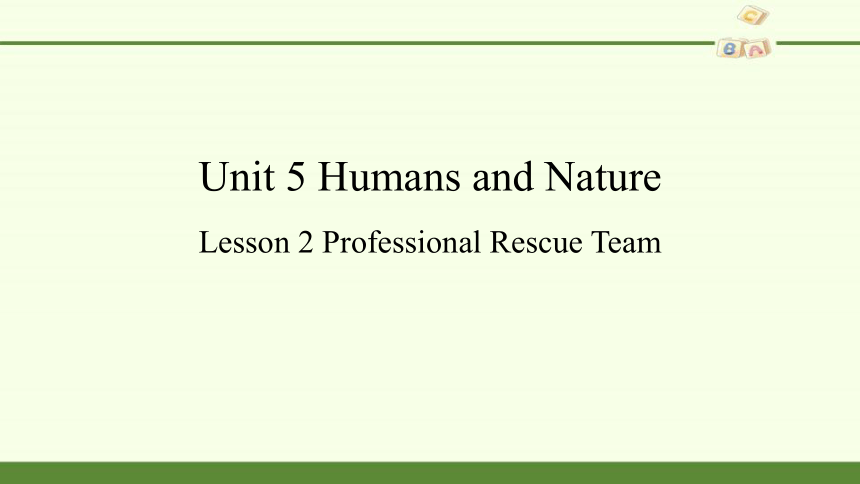
|
|
| 格式 | zip | ||
| 文件大小 | 3.9MB | ||
| 资源类型 | 教案 | ||
| 版本资源 | 北师大版(2019) | ||
| 科目 | 英语 | ||
| 更新时间 | 2023-03-23 14:19:42 | ||
图片预览


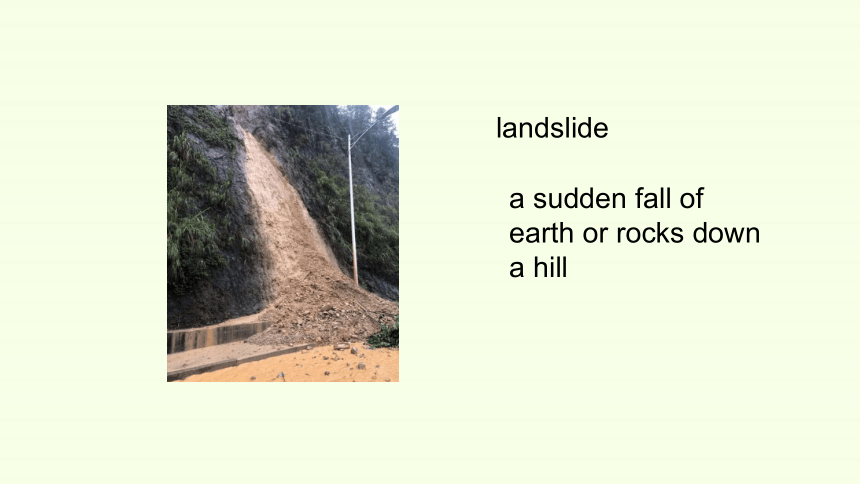
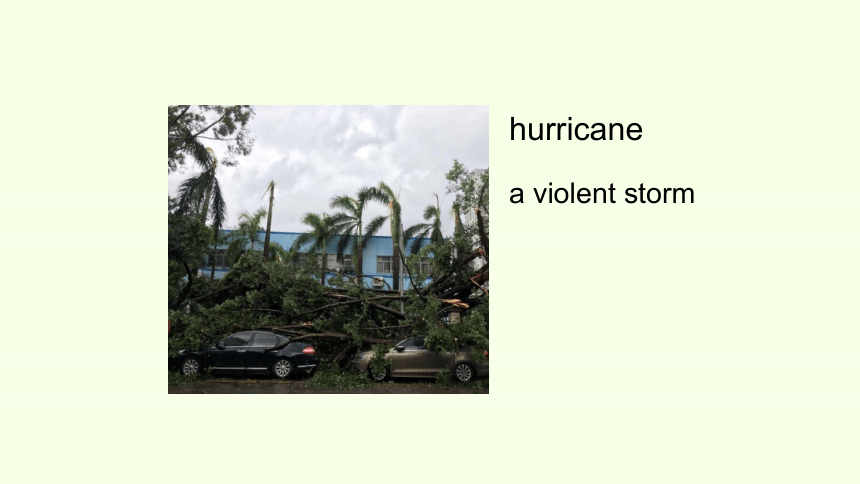
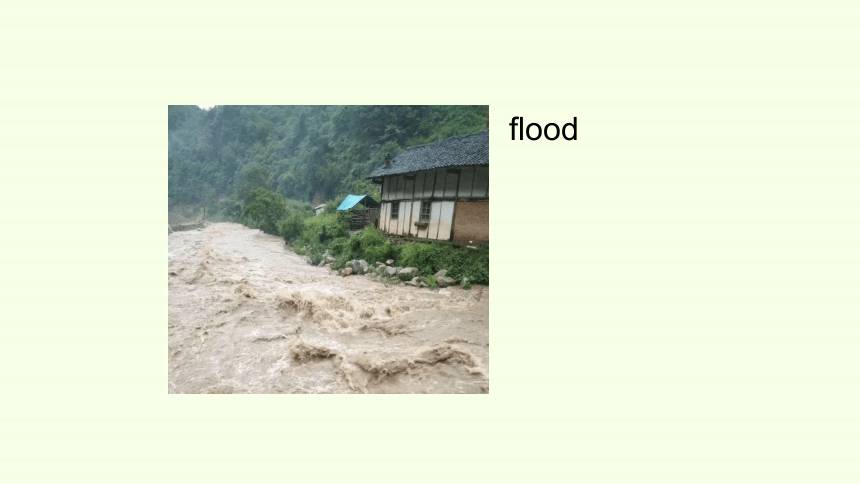
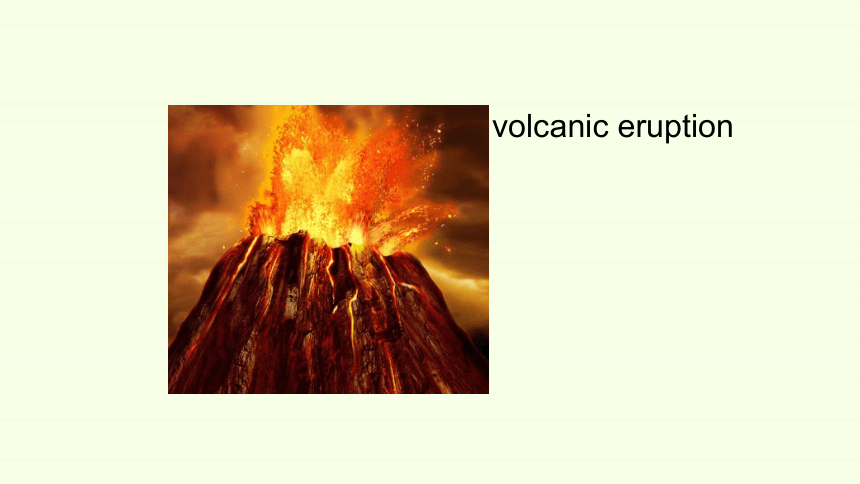
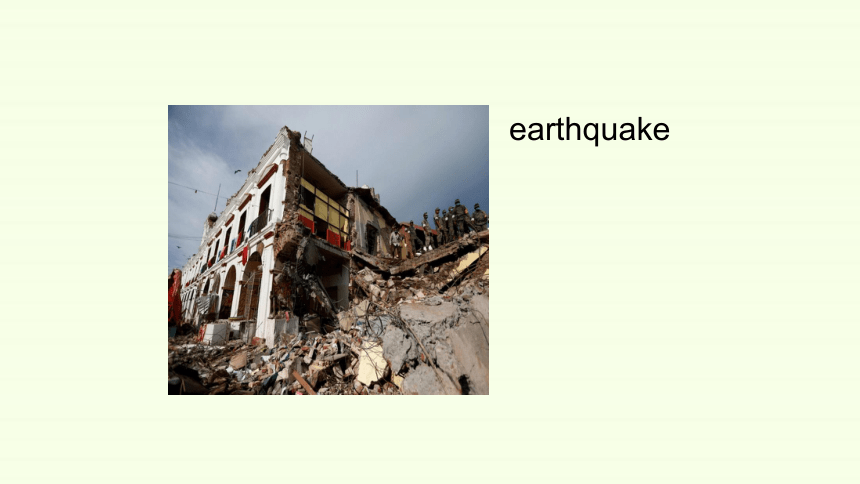
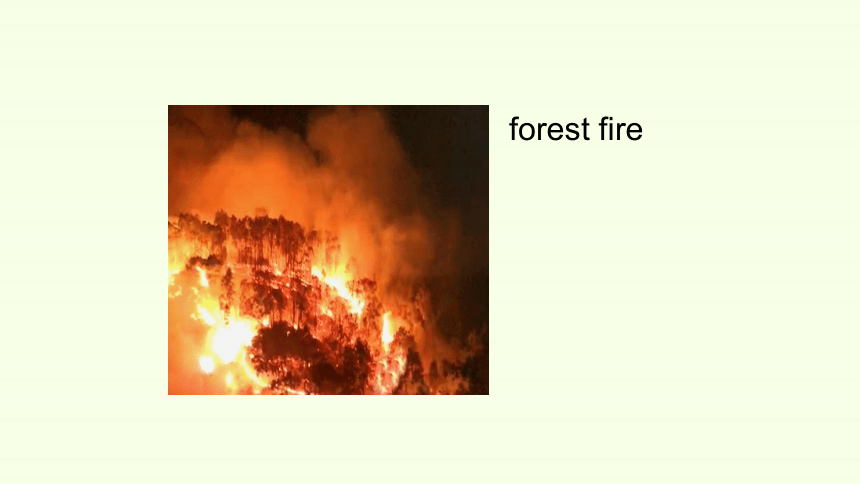
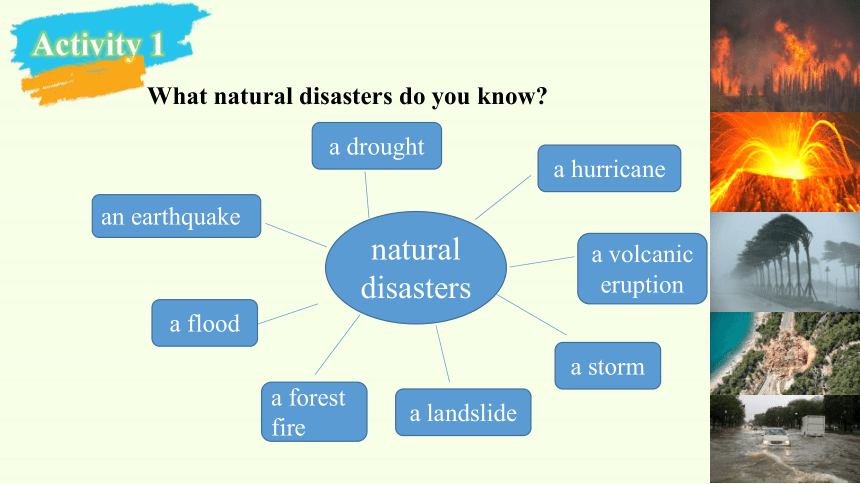
文档简介
(共29张PPT)
Unit 5 Humans and Nature
Lesson 2 Professional Rescue Team
drought
a long period of dry weather when there is not enough water
a sudden fall of earth or rocks down a hill
landslide
hurricane
a violent storm
flood
volcanic eruption
earthquake
forest fire
What natural disasters do you know
Activity 1
natural disasters
a drought
an earthquake
a flood
a forest fire
a landslide
a storm
a volcanic eruption
a hurricane
Group Work: Have you experienced any natural disasters
What happened
How did you feel
Did you need help
Match.
( ) 1. Search and rescue vehicles are brought into destroyed areas.
( ) 2. Trained dogs are used to help search for anyone who is still alive.
( ) 3. Rescue teams try to save people trapped under buildings.
( ) 4. Many houses are destroyed by the terrible flood.
d
c
a
b
Activity 2
Listen to the first part of an interview.
What is the interview about
Who is the interviewee
Which two disasters are mentioned
what search and rescue teams do when a natural disaster happens.
The interviewee is Mr. Wang
They mentioned two disasters, the Winchman earthquake, the Nepal earthquake.
Activity 3
Skill Builder: Listening for Main Ideas and Details
Main ideas are the key points of a presentation or a talk. They are supported by details.
Main Ideas
emphasized statement (usually at the beginning and end)
repeated key words, phrases and ideas
Details
Specific information that supports the main idea, e.g., examples, causes, reasons, facts and descriptions.
1. Our first and most important goal is to __________. ( )
2. We use search and rescue vehicles and ____________ to look for anyone who is still alive. ( )
3. In a rescue attempt during the Nepal earthquake:
Over _____ members and six dogs took part, and we were there for twelve days. ( )
We rescued ____ people and provided medical help to over ______ people. ( )
4. It’s our duly to try to reduce _________ and _______________. ( )
save lives
Listen again, complete the sentences, and then decide if the sentences contain a main idea (MI) or a detail (D).
MI
trained dogs
sixty
two
2000
D
D
D
suffering
the loss of life
MI
1. Our first and most important goal is to __________. ( ) — Duration
2. We use search and rescue vehicles and ____________ to look for anyone who is still alive. ( )
3. In a rescue attempt during the Nepal earthquake: — the results/achievements
Over _____ members and six dogs took part, and we were there for twelve days. ( )
We rescued ____ people and provided medical help to over ______ people. ( )
4. It’s our duly to try to reduce _________ and _______________. ( ) — the duty
Why did we need the specific information
save lives
Listen again, complete the sentences, and then decide if the sentences contain a main idea (MI) or a detail (D).
MI
trained dogs
sixty
two
2000
D
D
D
suffering
the loss of life
MI
— the tools/methods
In a rescue attempt during the Nepal Earthquake, over 60 members and 6 dogs took part, and we were there for 12 days.
Who took part in the rescue attempt in Nepal after the earthquake
How many people did you help
What is your attitude towards your job
It’s our duty to try to reduce suffering and the loss of life.
We rescued 2 people and provided medical help to over 2000 people
What is the most important goal of search and rescue attempts
Our first and most important goal is to save lives.
How do rescue teams search for people who might be alive
We use search and rescue vehicles and trained dogs to look for anyone who is still alive.
Rescue operations
professional
Rescue team
Rescue attempts
attitude
duty
__________________________
_________________________
_________________________
_____________________________________________________
Search and rescue vehicles ______________________________
obstacles
_____________________________________
Over 60members and six dogs
took part.
rescued 2 people & provided medical help to over 2000 people.
to look for anyone
Reduce suffering
Reduce the loss of life
Save lives
Battle against time
Be under great pressure
Activity 5 Fill in blanks
What obstacles did they meet in rescuing people
What kind of person did the rescue teams have
presenter
Mr Wang
student
introduce the topic and ask questions
talk about China International Search and Rescue Team
ask questions
Suppose you were invited to take part in a radio interview, which role would you like to play
Task 5 Role Play
“Today, Mr. Wang is here to tell us all about professional teams who work in natural disaster rescue.”
“Hello! Thanks for having me. I am so happy to be here to introduce my professional teams and share our experiences in natural disaster rescue.”
“I am Li Hua from Hong Xing Middle School, and I have a question …”
Checklist
voice their opinion naturally.
state their reasons with some evidences.
use the useful expressions and phrases in the text.
introduce the tools and rescue attempts as well as duty.
Is the text well –organized with linking words.
Reflection
Things I learned about rescue team .
.
The most impressive sentences I would like to remember and use from the class:
.
.
Mr wang was invited to talk about what _____________________ did when a ____________ happened. He had been part of many rescue operations _______ as well as in China. He told us their first and most important goal is to _________ and gave us an example, one of his recent ________, the Nepal earthquake. His team tried their best to rescued 2 people and provided ____________ to over 2000 people. It was a very ___________ process, just like a _____ against time.
professional rescue teams
natural disaster
overseas
save lives
attempts
medical help
challenging
battle
Activity 4
Pair Work: Work out four questions you may ask according to the information in Activity 3. Then ask and answer the questions.
Questions Answers
1.
2.
3.
4.
Activity 5
1. Listen to the second part of the interview. What advice does Mr Wang give about surviving an earthquake when you’re outdoors, indoors or trapped
Outdoors Indoors Trapped
______________________ from any building or streetlights. _____________________ anything that can break or fall. ______________ to help people find you and ____________ when someone is nearby.
Stay away and move away
Stay away from
Knock on a wall
only shout
2. Do you have any other advice that might be helpful
Activity 6
Talk Builder: Maintaining, interrupting and ending a conversation.
Write M, I, or E.
1. Excuse me, Mr Wang, but can I interrupt you there ( )
2. OK, if I’m outdoors, … ( )
3. Sorry, but my advice is to … ( )
4. Sorry for interrupting again … ( )
5. Well, I’d love to know more, but, unfortunately, we’ve run out of time. ( )
6. So, I’m very sorry, but we’ll have to finish there. ( )
I
M
I
I
E
E
Activity 7
Can you find more ways to politely interrupt or end a conversation
To interrupt
1. Do you mind if I interrupt
2. I’d like to add something to that, …
3. I beg your pardon, but I need to say something.
4. …
To end
1. It’s been great talking with you.
2. Please excuse me, I have to, …
3. Please get in touch if I can help you in any way.
4. …
Activity 8
Pair Work: Role Play
Situation 1: Two friends talking on the phone
Friend 1: talking about his/her worries for the next day’s presentation
Friend 2: needs to end the conversation so as to catch a train
Situation 2: An English teacher and a student in an English class
English teacher: explaining how to use relative clauses
Student: needs to interrupt so as to ask a question
——课上我是否全身心投入学习了?有些时候精力不够集中的原因是什么?
课上是否有跟不上老师上课进度的情况?原因是什么?如何改进?
——课前关注的重点和难点是否已解决?课后复习还需要关注哪些方面?
——自己在小组课堂活动中的表现是否积极主动?口语表达如何?能否听懂他人的表达?和其他同学相比我的优点有哪些?不足之处有哪些?
——掌握的单词和句型能否满足短文写作的任务要求?篇章布局和写作风格方面还需要注意什么?能否借鉴汉语的写作手法?
Unit 5 Humans and Nature
Lesson 2 Professional Rescue Team
drought
a long period of dry weather when there is not enough water
a sudden fall of earth or rocks down a hill
landslide
hurricane
a violent storm
flood
volcanic eruption
earthquake
forest fire
What natural disasters do you know
Activity 1
natural disasters
a drought
an earthquake
a flood
a forest fire
a landslide
a storm
a volcanic eruption
a hurricane
Group Work: Have you experienced any natural disasters
What happened
How did you feel
Did you need help
Match.
( ) 1. Search and rescue vehicles are brought into destroyed areas.
( ) 2. Trained dogs are used to help search for anyone who is still alive.
( ) 3. Rescue teams try to save people trapped under buildings.
( ) 4. Many houses are destroyed by the terrible flood.
d
c
a
b
Activity 2
Listen to the first part of an interview.
What is the interview about
Who is the interviewee
Which two disasters are mentioned
what search and rescue teams do when a natural disaster happens.
The interviewee is Mr. Wang
They mentioned two disasters, the Winchman earthquake, the Nepal earthquake.
Activity 3
Skill Builder: Listening for Main Ideas and Details
Main ideas are the key points of a presentation or a talk. They are supported by details.
Main Ideas
emphasized statement (usually at the beginning and end)
repeated key words, phrases and ideas
Details
Specific information that supports the main idea, e.g., examples, causes, reasons, facts and descriptions.
1. Our first and most important goal is to __________. ( )
2. We use search and rescue vehicles and ____________ to look for anyone who is still alive. ( )
3. In a rescue attempt during the Nepal earthquake:
Over _____ members and six dogs took part, and we were there for twelve days. ( )
We rescued ____ people and provided medical help to over ______ people. ( )
4. It’s our duly to try to reduce _________ and _______________. ( )
save lives
Listen again, complete the sentences, and then decide if the sentences contain a main idea (MI) or a detail (D).
MI
trained dogs
sixty
two
2000
D
D
D
suffering
the loss of life
MI
1. Our first and most important goal is to __________. ( ) — Duration
2. We use search and rescue vehicles and ____________ to look for anyone who is still alive. ( )
3. In a rescue attempt during the Nepal earthquake: — the results/achievements
Over _____ members and six dogs took part, and we were there for twelve days. ( )
We rescued ____ people and provided medical help to over ______ people. ( )
4. It’s our duly to try to reduce _________ and _______________. ( ) — the duty
Why did we need the specific information
save lives
Listen again, complete the sentences, and then decide if the sentences contain a main idea (MI) or a detail (D).
MI
trained dogs
sixty
two
2000
D
D
D
suffering
the loss of life
MI
— the tools/methods
In a rescue attempt during the Nepal Earthquake, over 60 members and 6 dogs took part, and we were there for 12 days.
Who took part in the rescue attempt in Nepal after the earthquake
How many people did you help
What is your attitude towards your job
It’s our duty to try to reduce suffering and the loss of life.
We rescued 2 people and provided medical help to over 2000 people
What is the most important goal of search and rescue attempts
Our first and most important goal is to save lives.
How do rescue teams search for people who might be alive
We use search and rescue vehicles and trained dogs to look for anyone who is still alive.
Rescue operations
professional
Rescue team
Rescue attempts
attitude
duty
__________________________
_________________________
_________________________
_____________________________________________________
Search and rescue vehicles ______________________________
obstacles
_____________________________________
Over 60members and six dogs
took part.
rescued 2 people & provided medical help to over 2000 people.
to look for anyone
Reduce suffering
Reduce the loss of life
Save lives
Battle against time
Be under great pressure
Activity 5 Fill in blanks
What obstacles did they meet in rescuing people
What kind of person did the rescue teams have
presenter
Mr Wang
student
introduce the topic and ask questions
talk about China International Search and Rescue Team
ask questions
Suppose you were invited to take part in a radio interview, which role would you like to play
Task 5 Role Play
“Today, Mr. Wang is here to tell us all about professional teams who work in natural disaster rescue.”
“Hello! Thanks for having me. I am so happy to be here to introduce my professional teams and share our experiences in natural disaster rescue.”
“I am Li Hua from Hong Xing Middle School, and I have a question …”
Checklist
voice their opinion naturally.
state their reasons with some evidences.
use the useful expressions and phrases in the text.
introduce the tools and rescue attempts as well as duty.
Is the text well –organized with linking words.
Reflection
Things I learned about rescue team .
.
The most impressive sentences I would like to remember and use from the class:
.
.
Mr wang was invited to talk about what _____________________ did when a ____________ happened. He had been part of many rescue operations _______ as well as in China. He told us their first and most important goal is to _________ and gave us an example, one of his recent ________, the Nepal earthquake. His team tried their best to rescued 2 people and provided ____________ to over 2000 people. It was a very ___________ process, just like a _____ against time.
professional rescue teams
natural disaster
overseas
save lives
attempts
medical help
challenging
battle
Activity 4
Pair Work: Work out four questions you may ask according to the information in Activity 3. Then ask and answer the questions.
Questions Answers
1.
2.
3.
4.
Activity 5
1. Listen to the second part of the interview. What advice does Mr Wang give about surviving an earthquake when you’re outdoors, indoors or trapped
Outdoors Indoors Trapped
______________________ from any building or streetlights. _____________________ anything that can break or fall. ______________ to help people find you and ____________ when someone is nearby.
Stay away and move away
Stay away from
Knock on a wall
only shout
2. Do you have any other advice that might be helpful
Activity 6
Talk Builder: Maintaining, interrupting and ending a conversation.
Write M, I, or E.
1. Excuse me, Mr Wang, but can I interrupt you there ( )
2. OK, if I’m outdoors, … ( )
3. Sorry, but my advice is to … ( )
4. Sorry for interrupting again … ( )
5. Well, I’d love to know more, but, unfortunately, we’ve run out of time. ( )
6. So, I’m very sorry, but we’ll have to finish there. ( )
I
M
I
I
E
E
Activity 7
Can you find more ways to politely interrupt or end a conversation
To interrupt
1. Do you mind if I interrupt
2. I’d like to add something to that, …
3. I beg your pardon, but I need to say something.
4. …
To end
1. It’s been great talking with you.
2. Please excuse me, I have to, …
3. Please get in touch if I can help you in any way.
4. …
Activity 8
Pair Work: Role Play
Situation 1: Two friends talking on the phone
Friend 1: talking about his/her worries for the next day’s presentation
Friend 2: needs to end the conversation so as to catch a train
Situation 2: An English teacher and a student in an English class
English teacher: explaining how to use relative clauses
Student: needs to interrupt so as to ask a question
——课上我是否全身心投入学习了?有些时候精力不够集中的原因是什么?
课上是否有跟不上老师上课进度的情况?原因是什么?如何改进?
——课前关注的重点和难点是否已解决?课后复习还需要关注哪些方面?
——自己在小组课堂活动中的表现是否积极主动?口语表达如何?能否听懂他人的表达?和其他同学相比我的优点有哪些?不足之处有哪些?
——掌握的单词和句型能否满足短文写作的任务要求?篇章布局和写作风格方面还需要注意什么?能否借鉴汉语的写作手法?
同课章节目录
- Unit 4 Information technology
- Lesson 1 Avatars
- Lesson 2 Apps
- Lesson 3 Internet and Friendships
- Unit 5 Humans and nature
- Lesson 1 A Sea Story
- Lesson 2 Professional Rescue Team
- Lesson 3 Race to the Pole
- Unit 6 The admirable
- Lesson 1 A Medical Pioneer
- Lesson 2 History Makers
- Lesson 3 The Superhero Behind Superman
